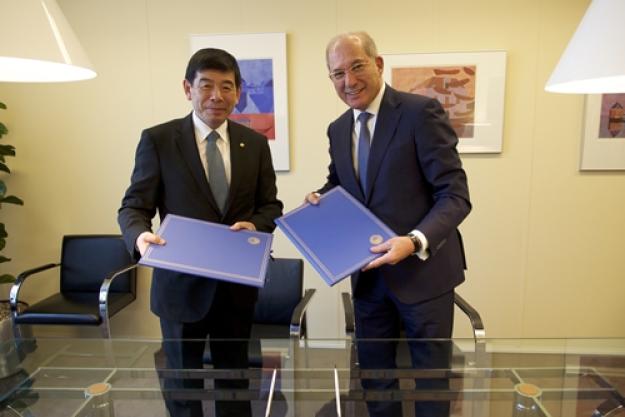
OPCW Director-General, Ahmet Üzümcü (right), and the WCO Secretary General, Mr Kunio Mikuriya (left), today signed a Memorandum of Understanding (MOU) to tighten national and international controls on the trade of toxic chemicals.
THE HAGUE, Netherlands — 13 January 2017 — The Organisation for the Prohibition for Chemical Weapons (OPCW) and the World Customs Organization (WCO) signed a Memorandum of Understanding (MOU) today that expands cooperation to tighten national and international controls on the trade of toxic chemicals.
The new agreement puts in place procedures that will further enhance cooperation between the OPCW and WCO through consultations, exchanges of information and documents, technical cooperation, as well as cross-representation at relevant meetings. The Memorandum was signed by the OPCW Director-General, Ambassador Ahmet Üzümcü, and the WCO Secretary General, Mr Kunio Mikuriya.
“This strategic partnership constitutes a significant step forward to assist States Parties’ efforts in enhancing the capabilities of national customs authorities to exercise the oversight necessary for the trade of dual-use chemicals. This will help them prevent the misuse of toxic chemicals, and promote peaceful use of chemistry, thus contributing to a safer world. Current threats posed by non-state actors make control over these transfers especially important for international security,” Ambassador Üzümcü observed.
“I am pleased that with the support of the OPCW, customs administrations will be in a better position to meet the complex challenges posed by the illegal trade in toxic and dual-use chemicals. By combining our expertise and resources, as well as our years of experience in building enforcement capacity and strengthening trade controls, this partnership provides the WCO and the OPCW with the means to mobilise customs officials worldwide, enabling a significant impact to be made at borders,” said Secretary General Mikuriya.
Customs authorities around the world play a significant role in detecting and preventing the illegal trade of chemicals relevant to the Convention. A close partnership with the WCO constitutes another step in the OPCW’s path to reducing the risk of chemicals used as weapons.
Background
The World Customs Organization, established in 1952 as the Customs Co-operation Council (CCC), is an independent intergovernmental body with a mission to enhance the effectiveness of customs administrations. The WCO represents 180 customs administrations across the globe that collectively process approximately 98% of world trade.
The OPCW Executive Council authorised the signing of the MOU with the WCO on 13 October 2016.
As the implementing body for the Chemical Weapons Convention, the OPCW oversees the global endeavour to permanently eliminate chemical weapons. Since the Convention’s entry into force in 1997 – with its 192 States Parties – it is the most successful disarmament treaty eliminating an entire class of weapons of mass destruction. To date, nearly 94 per cent of all chemical weapon stockpiles declared by possessor States have been destroyed under OPCW verification. For its extensive efforts in eliminating chemical weapons, the OPCW received the 2013 Nobel Prize for Peace.
